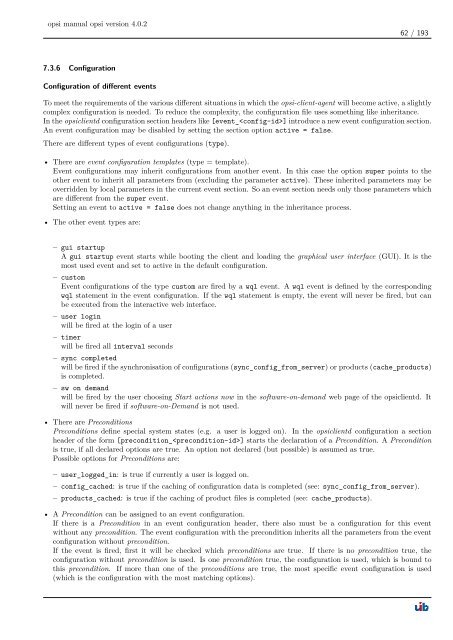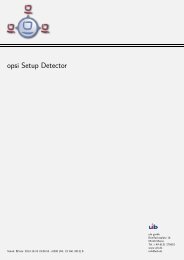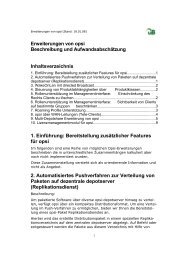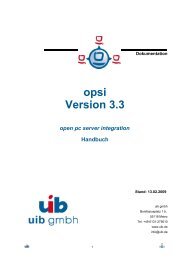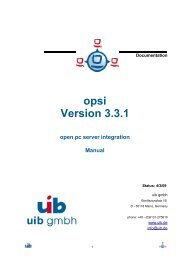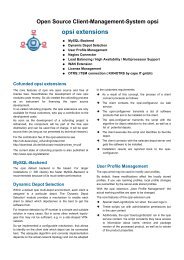opsi manual opsi version 4.0.2 - opsi Download - uib
opsi manual opsi version 4.0.2 - opsi Download - uib
opsi manual opsi version 4.0.2 - opsi Download - uib
Create successful ePaper yourself
Turn your PDF publications into a flip-book with our unique Google optimized e-Paper software.
<strong>opsi</strong> <strong>manual</strong> <strong>opsi</strong> <strong>version</strong> <strong>4.0.2</strong><br />
7.3.6 Configuration<br />
Configuration of different events<br />
62 / 193<br />
To meet the requirements of the various different situations in which the <strong>opsi</strong>-client-agent will become active, a slightly<br />
complex configuration is needed. To reduce the complexity, the configuration file uses something like inheritance.<br />
In the <strong>opsi</strong>clientd configuration section headers like [event_] introduce a new event configuration section.<br />
An event configuration may be disabled by setting the section option active = false.<br />
There are different types of event configurations (type).<br />
• There are event configuration templates (type = template).<br />
Event configurations may inherit configurations from another event. In this case the option super points to the<br />
other event to inherit all parameters from (excluding the parameter active). These inherited parameters may be<br />
overridden by local parameters in the current event section. So an event section needs only those parameters which<br />
are different from the super event.<br />
Setting an event to active = false does not change anything in the inheritance process.<br />
• The other event types are:<br />
– gui startup<br />
A gui startup event starts while booting the client and loading the graphical user interface (GUI). It is the<br />
most used event and set to active in the default configuration.<br />
– custom<br />
Event configurations of the type custom are fired by a wql event. A wql event is defined by the corresponding<br />
wql statement in the event configuration. If the wql statement is empty, the event will never be fired, but can<br />
be executed from the interactive web interface.<br />
– user login<br />
will be fired at the login of a user<br />
– timer<br />
will be fired all interval seconds<br />
– sync completed<br />
will be fired if the synchronisation of configurations (sync_config_from_server) or products (cache_products)<br />
is completed.<br />
– sw on demand<br />
will be fired by the user choosing Start actions now in the software-on-demand web page of the <strong>opsi</strong>clientd. It<br />
will never be fired if software-on-Demand is not used.<br />
• There are Preconditions<br />
Preconditions define special system states (e.g. a user is logged on). In the <strong>opsi</strong>clientd configuration a section<br />
header of the form [precondition_] starts the declaration of a Precondition. A Precondition<br />
is true, if all declared options are true. An option not declared (but possible) is assumed as true.<br />
Possible options for Preconditions are:<br />
– user_logged_in: is true if currently a user is logged on.<br />
– config_cached: is true if the caching of configuration data is completed (see: sync_config_from_server).<br />
– products_cached: is true if the caching of product files is completed (see: cache_products).<br />
• A Precondition can be assigned to an event configuration.<br />
If there is a Precondition in an event configuration header, there also must be a configuration for this event<br />
without any precondition. The event configuration with the precondition inherits all the parameters from the event<br />
configuration without precondition.<br />
If the event is fired, first it will be checked which preconditions are true. If there is no precondition true, the<br />
configuration without precondition is used. Is one precondition true, the configuration is used, which is bound to<br />
this precondition. If more than one of the preconditions are true, the most specific event configuration is used<br />
(which is the configuration with the most matching options).


